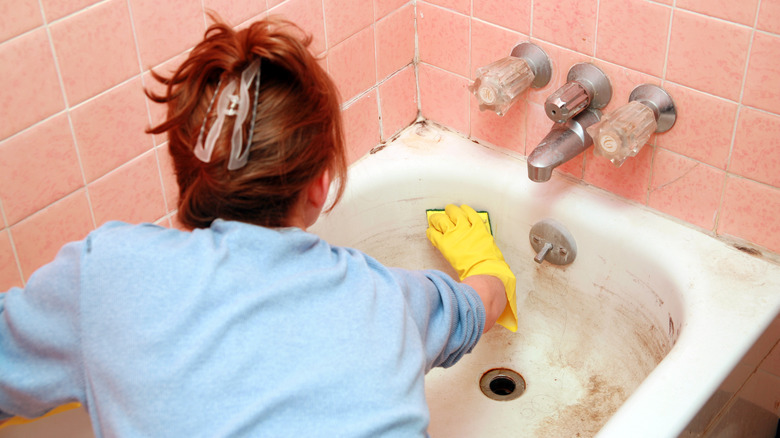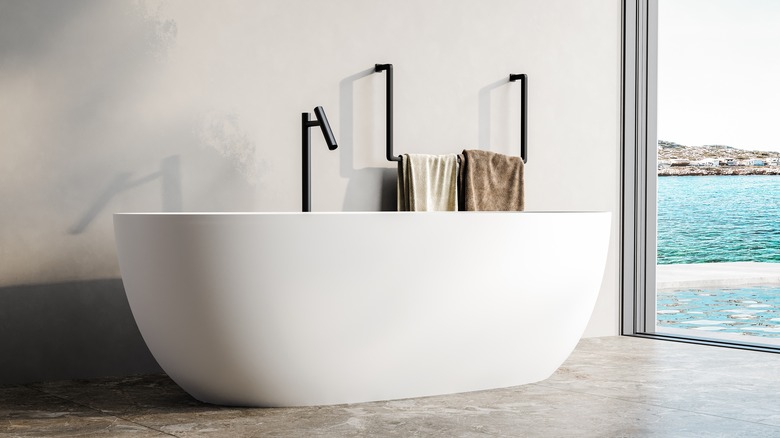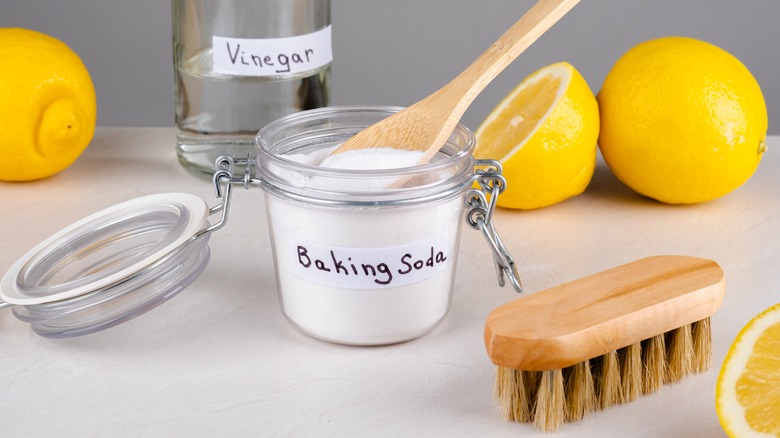Using Oven Cleaner On Dirty Bathtubs: Good Idea Or Avoid At All Costs?
We may receive a commission on purchases made from links.
Exploring the realm of using oven cleaner for cleaning a dirty bathtub poses questions, and the idea of repurposing an item commonly found in kitchens for a task outside its designated use sparks curiosity. It also necessitates a deeper examination to ascertain its practicality and safety. Oven cleaner's formidable formula, engineered to conquer grease and stubborn residues in ovens, could extend its use to your bathroom. The idea is to spray the cleaner all around the bathtub and let it work its magic for a couple of hours before wiping away the grime and rinsing it clean.
Indeed, the prospect of a cleaner that effortlessly cuts through persistent soap scum and stains is enticing, especially when dealing with bathroom cleaners that often fall short. However, it's crucial to consider various types of bathtubs and the materials they are crafted from. Despite the optimistic outlook, a critical evaluation reveals potential drawbacks that warrant consideration. The chemicals present in oven cleaners, while potent in their cleaning capabilities, may pose a risk to the surface of the bathtub, particularly if it is composed of materials vulnerable to corrosive effects.
Additionally, the emission of strong fumes during the cleaning process raises concerns about indoor air quality. Therefore, users must exercise caution and prioritize proper ventilation when experimenting with this unconventional cleaning method. Before deciding whether to embark on the oven cleaner route, there are several elements to keep in mind.
Things to consider
It is important to acknowledge that the effectiveness of oven cleaners can be contingent on various factors. The type of bathtub material plays a pivotal role, as certain surfaces may react differently to the potent chemicals in the cleaner. For porcelain or enamel tubs, the dissolving power of oven cleaner might be more advantageous, while fiberglass tubs with metal trim could be more susceptible to damage, so use it with caution and be careful to avoid damaging the finish.
The very strength that makes oven cleaner effective may also be its Achilles' heel when it comes to certain bathtub surfaces. The harsh chemicals, if not compatible with the material, can lead to erosion, discoloration, and other forms of damage. Moreover, the emission of strong fumes during the cleaning process should not be ignored. Individuals with respiratory sensitivities or those living in poorly ventilated spaces must exercise caution.
The enthusiasm for a quick and effective cleaning solution should always be balanced with a careful assessment of these concerns, ensuring that the benefits outweigh the risks for a given bathtub type. There are fume-free oven cleaners, such as this one from Amazon, that can be used if you want to try this tip but have concerns about adequate ventilation.
Natural alternatives
Choosing a natural oven cleaner, such as something like Dirtbuster Bio Oven Cleaning Paste, may provide a safer alternative for cleaning a bathtub, particularly when compared to conventional cleaners with harsher chemicals. These natural cleaners often incorporate ingredients such as baking soda, vinegar, citrus extracts, and essential oils, which are known for their gentleness on various bathtub materials like porcelain, enamel, acrylic, or fiberglass.
Another notable advantage is the reduced environmental impact, as natural cleaners are typically biodegradable, breaking down easily and avoiding the contribution of harmful chemical residues to water systems. Additionally, natural cleaners tend to be safer for human health, producing fewer fumes and posing less risk of respiratory irritation, making them a suitable choice for individuals with sensitivities.
While not as potent as their chemical counterparts, natural cleaners are ideal for regular cleaning and maintenance, especially for mild stains. DIY options are also another choice, such as simple paste made from baking soda and water, allowing users to control the ingredients and tailor the cleaning solution to their preferences. It's always advisable to test a small area first, especially if uncertain about the oven cleaner's interaction with the bathtub material.


